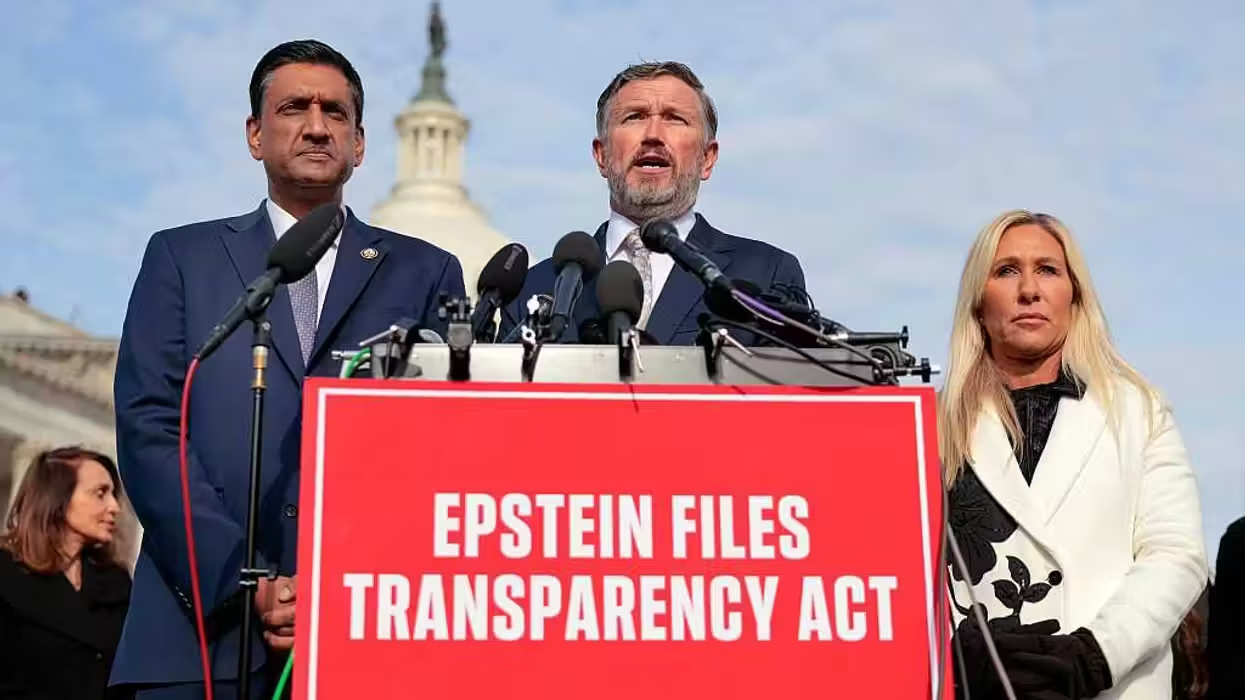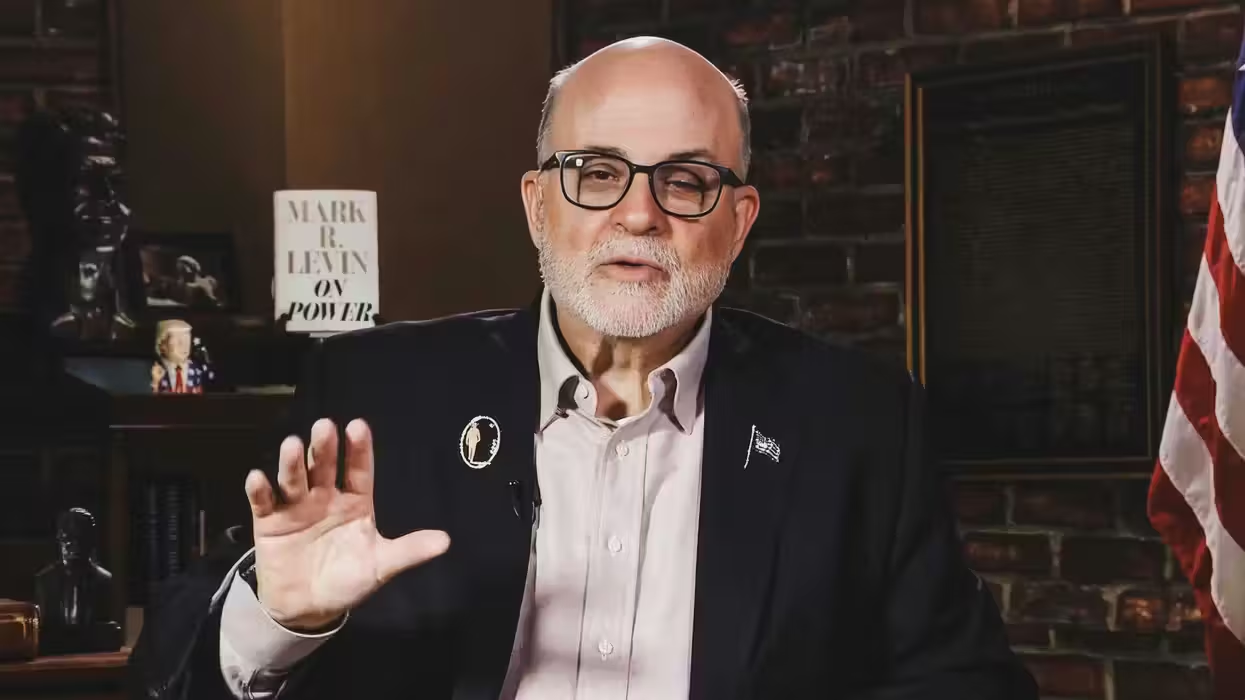Ever since President Obama's surprising and (to many) disappointing victory in the electoral college, conservatives have been scrambling to find answers to explain the loss. Many wonder openly how they could have misread the electorate this badly, whether the country has shifted from being ideologically center-right to ideologically center-left, and if the key demographics that seem to be increasing with every election cycle can be harnessed to create a new, different conservative coalition.
These are all urgent questions, and conservatives interested in winning should be tackling them. Unfortunately, aside from being a wake-up call, losing an election can also be a grieving process, and the first stage of grief, as any psychologist will tell you, is "denial."
As such, there has emerged a small, politically marginal but vocal minority within the conservative coalition that simply refuses to accept A) that President Obama won legitimately, and B) that conservatives' assumptions about the makeup of the electorate were wrong. Instead, they argue, massive voter fraud and tampering with the election must have taken place, and the only sensible thing to do now is to push as hard as possible for a more rigorously guarded recount of the votes. In fact, a petition calling for this precise action has already racked up more than 60,000 signatures on the White House's petition site.

While this petition - and those calling for the quixotic aim of secession - may be convenient ways for distraught conservatives to make themselves feel better, their overall effect is discrediting and dangerous. Moreover, as with secession, there is precisely zero chance that the election will be recounted. There are numerous reasons for this, which we will endeavor to explain below.
1. Lack of evidence
To begin with, there is insufficient evidence to prove that fraud could have impacted the election. Irregularities in the voting process are, unfortunately, a common problem with modern elections, and almost impossible to correct completely. It is a virtual certainty, in fact, that irregularities have happened in United States elections since at least the Presidential race of 1876, which historians agree was probably stolen by Republican Rutherford B. Hayes, even though Democratic nominee Samuel Tilden won the popular vote.
 Rutherford B. Hayes (Photo Credit: NNDB)
Rutherford B. Hayes (Photo Credit: NNDB)
Over the years since then, America's election system has tried to correct itself, with mixed success, partially because there are substantial political incentives for both parties to keep doors open to fraud that favors them, and partially because it's difficult to sift the genuine evidence of fraud from mere sour grapes by a losing candidate. Nevertheless, virtually everyone admits that, in the abstract, voter fraud is a serious problem. John Fund at National Review writes:
“Unfortunately, the United States has a long history of voter fraud that has been documented by historians and journalists,” Supreme Court Justice John Paul Stevens wrote in 2008, upholding a strict Indiana voter-ID law designed to combat fraud. Justice Stevens, who personally encountered voter fraud while serving on various reform commissions in his native Chicago, spoke for a six-member majority. In a decision two years earlier clearing the way for an Arizona ID law, the Court had declared in a unanimous opinion that “confidence in the integrity of our electoral processes is essential to the functioning of our participatory democracy. Voter fraud drives honest citizens out of the democratic process and breeds distrust of our government. Voters who fear their legitimate votes will be outweighed by fraudulent ones will feel disenfranchised.”
Indeed, a brand-new Rasmussen Reports poll finds that 64 percent of Americans believe voter fraud is a serious problem, with whites registering 63 percent agreement and African-Americans 64 percent. A Fox News poll taken last month found that 70 percent of Americans support requiring voters to show “state or federally issued photo identification” to prove their identity and citizenship before casting a ballot. Majorities of all demographic groups agreed on the need for photo ID, including 58 percent of non-white voters, 52 percent of liberals, and 52 percent of Democrats.
TheBlaze TV made the case earlier this month, too, that there is a problem.
That's a formidable amount of consensus that voter fraud is an issue that needs to be solved. However, preventing it is much easier than proving that it happened, for even in cases where fraud exists, it is ludicrously difficult to prove, especially on a widespread scale. Anecdotal evidence is easy to find, as citizen journalists like James O'Keefe have proven, but proving that a single corrupt official could have impacted the result of an election is very hard, if not impossible. There is a reason that in the space 10 years, the state of Texas has only been able to get about 60 cases of voter fraud to trial, and convict just half of that number: not because a number that small (30 cases in 10 years) is accurate, but because the standards of proof were too high for a large number to found guilty.
With that said, let's look at some of the arguments for why voter fraud must necessarily have taken place this election cycle. Usually, these accusations take the form of dubiously sourced numbers (or sometimes, numbers with no source at all), of which there are too many for us to debunk them all. However, a few have persistently cropped up, and are worth looking at, if only to show a) how flimsy they are as proof, and b) that even if they were true, they would have made no difference to the election's outcome.
The first, and probably most superficially persuasive argument, is that particular counties showed turnout over 100%. One of the more oft-cited places this happened is in Wood County Ohio, where it is alleged by some that turnout was 108%. A quick look at the actual results from Wood County shows this to be a fantasy. Actual turnout was around 60% for Wood County. The source of this statistic is unclear, though it likely originated with a Columbus Dispatch article that noted that Wood County had 109 registered voters for every 100 eligible (a curious phenomenon explained by the fact that many Ohio voters are "inactive," meaning they have either moved or haven't voted in four years). Even if that number is suspicious, apparently those 109 didn't turn out at the same rate they registered.
 In this Nov. 6, 2012 photo, United Auto Workers member Harry Van Uden attends a rally on Election Day at the UAW Region 1 technical training center in Warren, Mich. Credit: AP
In this Nov. 6, 2012 photo, United Auto Workers member Harry Van Uden attends a rally on Election Day at the UAW Region 1 technical training center in Warren, Mich. Credit: AP
Rachel Alexander of Intellectual Conservative has made a more comprehensive case for voter fraud's existence, which includes the 109 voter statistic, but also has a number of other claims. She compiles a list of statistics disputing the prospect of Obama winning Ohio, most of which rely upon registration statistics rather than turnout statistics (interesting numbers, but irrelevant given that registered voters do not necessarily equate to likely voters, or the voters who actually turnout as any pollster will tell you), and also relies on circumstantial evidence to argue that even if voter fraud can't be proven, it's very likely that it did happen. First, the statistical argument:
According to the Columbus Dispatch, one out of every five registered voters in Ohio is ineligible to vote. In at least two counties in Ohio, the number of registered voters exceeded the number of eligible adults who are of voting age. In northwestern Ohio's Wood County, there are 109 registered voters for every 100 people eligible to vote. An additional 31 of Ohio's 88 counties have voter registration rates over 90%, which most voting experts regard as suspicious. Obama miraculously won 100% of the vote in 21 districts in Cleveland, and received over 99% of the vote where GOP inspectors were illegally removed.
The inflated numbers can't just reflect voters who have moved, because the average voting registration level nationwide is only 70%. The vast majority of voters over the 70% level are not voting because they want to, they are voting because someone is getting them to cast a vote, one way or another. Those 31 counties are most likely the largest counties in Ohio, representing a majority of Ohio voters. This means the number of votes cast above the 70% typical voter registration level easily tops 100,000, the margin Obama won Ohio by.
Most of this is lifted directly from the Columbus Dispatch article cited above, and is admittedly good evidence that fraud in Ohio would be easy to commit. However, it's a long, difficult step from arguing that fraud is possible to arguing that it can demonstrably be proven to have happened on a wide enough scale to have cost a candidate the state. TheBlaze has already covered the bizarre case of the precincts where GOP nominee Mitt Romney got zero votes (about which the Town Hall article is wrong - Cleveland's own newspaper notes that only 9 precincts gave Obama a unanimous victory), and indeed, those numbers are suspicious.
However, the simpler explanation is that certain areas of Ohio (especially Cuyahoga) really are just that Democratic. After all, several precincts in Utah (a state as reliably Republican as Cuyahoga County is reliably Democratic) showed Barack Obama carrying zero votes, yet one suspects this was more due to ideological homogeneity than fraud, especially given that the precincts in question had just slightly over 500 voters in them to begin with. Had Romney gotten zero votes in the entire county, that would almost certainly be cause for investigation, but in nine out of over 1,000, and only in precincts with slightly over 500 votes? The case looks a lot weaker. In short, simple suspicion that something may have happened, or was likely to happen, does not constitute proof that it did happen.
This leaves out the far more problematic element of the article mentioned above, which argues that Obama may have also won by suppressing the military vote. Yet if voter fraud is difficult to prove, voter suppression is nigh impossible to prove, and short of a smoking gun (which does not exist) showing that military ballots were illegally ignored, this argument would have absolutely no force of law. Indeed, the voter "suppression" argument the author rehearses sounds suspiciously similar to the argument made by Leftists that voter ID laws make it too difficult for minorities to vote, in that the author argues that military voters find it too difficult to get absentee ballots because of existing law. But laws that make voting difficult are not, a priori, unconstitutional, and someone choosing not to go through the hassle of obtaining an absentee ballot does not necessarily constitute voter suppression.
But suppose you ignore these mitigating factors and grant that voter fraud took place in Ohio (the only state seriously contested by the article). Even if you use that as an excuse to give Ohio to Romney, President Obama would still win the election handily thanks to a massive electoral vote lead. In fact, if you gave Romney both Ohio and Florida (states that went by narrower margins), Obama would still win. As such, the fraud argument is an interesting academic digression, but it would do nothing to change the outcome of the election in the two states where it appears to be most likely.
2. Lack of precedent
Given the previous problems, in order to salvage Romney's chances a nationwide do-over -- not just a recount -- with extremely strict poll monitoring to guard against any possible fraud, would be necessary. And that is genuinely impossible.
Why? Start with the obvious point: State-by-state recounts are relatively rare in presidential elections, while nationwide recounts are not only unheard of, but structurally impossible. Why? Because, as many liberals discovered to their initial dismay in the aftermath of Hurricane Sandy, elections are quite literally run on a state-by-state basis. Every state has its own legally mandated margin for a recount, and in the absence of successful lawsuits, most states will likely certify their own election results rather than move to a recount. The only state that moved to a recount because of a legal requirement to do so this election cycle was Florida, which eventually resolved itself in favor of Obama. Other states had results well outside the margin mandating a recount.
Lawsuits could be brought to recount the votes in every state, of course, but don't expect either political campaign to do this, largely because it would be obscenely costly just to initiate proceedings. With appeals and fees, such an effort would eat up a campaign's war chest before anything could get done. National parties wouldn't take the initiative either, not just because of money, but also because a recount (or a do-over) would open up an unresolvable can of worms whereby one party (the Democrats) claim voter suppression via laws like voter ID, while Republicans claim voter fraud based on evidence like the evidence presented above. In either case, nothing could be proven, and courts would throw them out.
Both parties also know to ignore this kind of evidence from experience, because they've both been on the receiving end of similar accusations. It's easy to forget now, but after the 2004 elections, Democrats claimed George W. Bush had stolen the election and developed extremely fancy statistical modeling techniques to prove as much in every election since then. In fact, one such leftist election pundit, Richard Charnin, claims that voter fraud benefitted Romney this election cycle. According to Charnin, who runs a website disputing every election since 1968, Obama should have won at least 370 (!) electoral votes.
However, for all Charnin's speculative number-mongering, Democrats have not attempted to contest any of the elections that he argues they should have "won" using his evidence, with the exception of 2000, and that only because the electoral vote and popular vote diverged. Moreover, seeing as Obama's margin in the popular vote is closer to Bush's against Kerry in 2004 than the razor thin margin held by Democrat John F. Kennedy in 1960 (another election where fraud is generally agreed to have happened), Republicans would be unlikely to see it as a repeat of that election.
In fact, many Republicans may listen to the cries of voter fraud and hear nothing but echoes of the sorts of people who argued that polls were wrong because they showed too high a Democratic turnout advantage, and now still can't believe that turnout advantage actually surfaced. The fact that these accusations of fraud have, in some cases, taken on an ugly racial tinge is just one more reason why Republicans would seek to avoid conferring legitimacy on those making them.
Bottom line: You can't "unskew" an election, and those that want to try will get nowhere politically or practically. As RedState's Erick Erickson wrote:
Barack Obama won. He won by turning out the most people in a well run campaign. In other words, he won fair and square.[...]
Too many people have spent the past four years obsessed with birth certificates. Now they are obsessed with voter fraud conspiracies, talk of secession, and supposed election changing news stories if only we had known.
There is nothing to know. Barack Obama defeated Mitt Romney last week by running a superior campaign and turning out his supporters more aggressively than Romney did. The vast majority of state-level polling companies were right, and the vast majority of national polling companies were wrong (with the exception of the poll run by TIPP - ironically, a company hired by a conservative news source, IBD).
The election is over. The fight for America, however, may be just beginning.








